|
Books Should Be Free Loyal Books Free Public Domain Audiobooks & eBook Downloads |
|
|
Books Should Be Free Loyal Books Free Public Domain Audiobooks & eBook Downloads |
|
Literature |
|---|
|
Book type:
Sort by:
View by:
|
By: Jerome K. Jerome (1859-1927) | |
|---|---|
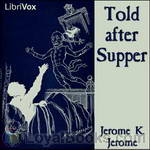 Told after Supper
Told after Supper
It is Christmas Eve, and the narrator, his uncle and sundry other local characters are sitting round the fire drinking copious quantities of whisky punch and telling ghost stories until bedtime, when… But no, I won’t spoil the fun. This is a little gem: Jerome at his tongue-in-cheek best. | |
 Stage Land
Stage Land
A comic look at the curious habits and customs of the inhabitants of ‘Stage Land’. Dedicated to ‘that highly respectable but unnecessarily retiring individual, of whom we hear so much but see so little, “the earnest student of drama” | |
 They and I
They and I
A man and his three children leave the “Little Mother” at home in the city and set up temporary housekeeping in a country cottage to supervise the remodeling of the house he has just purchased there. The story is narrated by the father. His interactions with his children, interspersed with his own recollections of past events, make for hilarious reading. This is Jerome at his best, IMHO, although this is apparently one of this lesser known novels. | |
 Tea-table Talk
Tea-table Talk
As the New York Times said in 1903, this lesser-known work by Jerome K. Jerome does not display “the wit of Congreve or even the glittering sort Mr. Jerome employs in some of his other books.”It takes the form of imaginary conversations between the writer and a number of un-named characters at the afternoon tea table. The Woman of the World, the Old Maid, the Girton Girl, the Philosopher and the Minor Poet wax lyrical on subjects like marriage, art, society and politics. Frequently they appear to prefer the sound of their own voice to that of others... | |
 Idle Ideas in 1905
Idle Ideas in 1905
Back in 1905 Jerome K. Jerome shared his thoughts on a variety of subjects, including "Should Women Be Beautiful?", "Should Soldiers Be Polite?" and "Is The American Husband Made Entirely Of Stained Glass?". Every subject is analysed and commented on in the witty and satirical style we have grown to expect from the author. | |
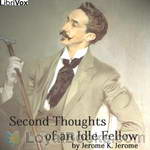 Second Thoughts Of An Idle Fellow
Second Thoughts Of An Idle Fellow
A second volume of humorous essays on various subjects, following the success of Idle thoughts Of An Idle Fellow. | |
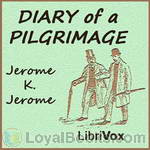 Diary of a Pilgrimage
Diary of a Pilgrimage
A possibly fictionalised account by the comic novelist Jerome K. Jerome of a trip to Germany that he undertook with a friend in order to see the famous Passion Play at Oberammergau. The journey takes in London, Dover, Ostend, Cologne, Munich, Oberau, Oberammergau and then back to London via Heidelberg. As one might expect from the author of 'Three Men in a Boat', much goes wrong along the way, including seasickness, strange food, stranger beds, misleading guidebooks, bewildering train timetables, and numerous cultural and linguistic misunderstandings. | |
 Fanny and the Servant Problem
Fanny and the Servant Problem
"It is so sad when relations don't get on together." "Sadder still when they think they've got a right to trample on you, just because you happen to be an orphan and - I don't want to talk about my relations. I want to forget them. I stood them for nearly six months. I don't want to be reminded of them. I want to forget that they ever existed." She is not going to have her wish. Oh, no, not at all. A comedy. - Summary by ToddHW Cast list: Fanny: Devorah Allen Vernon Wetherell, Lord Bantock... | |
By: Jessie Fothergill (1851-1891) | |
|---|---|
 The First Violin
The First Violin
May Wedderburn is a quiet provincial girl, living in small and seemingly boring Skernford. Underneath the dull exterior, there is mystery, suspicion and fear in this little town, surrounding the austere local wealthy landowner who is very interested in marrying poor May. It looks as though she will have to marry him whether she likes it or not until an unsuspected alliance is formed between her and a respected old lady. They both escape to Germany where music and excitement await them. | |
By: Joanna E. Wood (1867-1927) | |
|---|---|
 Untempered Wind
Untempered Wind
Upon publication of “The Untempered Wind” in 1894, Joanna Wood quickly rose to international prominence, becoming in the next few years the most highly paid fiction-writer in Canada. In this novel, we find a detailed picture of village life. The narrative weaves through a variety of character types: the refined and the coarse, the humble and the self-righteous, the virtuous and the vicious. All these types are measured according to their treatment of Myron Holder, a young unwed mother — a “fallen woman” in the eyes of this “spiteful, narrow-minded village... | |
By: Joel Chandler Harris (1848-1908) | |
|---|---|
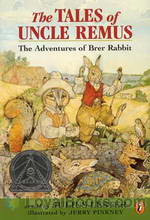 Uncle Remus
Uncle Remus
Bearing a striking resemblance to Aesop of Aesop's Fables fame, American author Joel Chandler Harris' Uncle Remus is also a former slave who loves to tell simple and pithy stories. Uncle Remus or to give it its original title, Uncle Remus: His Songs and His Sayings was published in late 1880 and received instant acclaim. The book was reviewed in hundreds of journals and newspapers across the country, leading to its immense success, both critical and financial. “Remus” was originally a fictional character in a newspaper column... | |
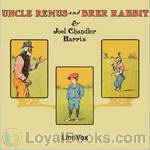 Uncle Remus and Brer Rabbit
Uncle Remus and Brer Rabbit
Uncle Remus' stories feature a trickster hero called Br'er Rabbit ("Brother" Rabbit), who uses his wits to slide out of trouble and gain the advantage over the slower witted other animals, many of whom are trying to eat him. Br'er Rabbit stories were mostly collected directly from the afro-american oral story-telling tradition and are said to be a direct interpretation of Yoruba tales of Hare. This book contains 11 unique stories and was the last one published before the author's death. (Introduction by Phil Chenevert) | |
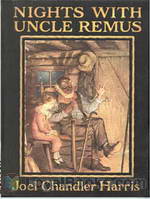 Nights With Uncle Remus
Nights With Uncle Remus
That the little boy loved Uncle Remus and his stories was so obvious that the tale-spinning sessions began drawing additional listeners. Daddy Jack, an old "Africa man" visiting from down-state; Sis Tempy, the strong chief of the mansion's servants; and Tildy, a young and pretty servant-girl - all found their way to Uncle Remus' rude cabin when their duties or interests permitted, to sit around the hearth and hear the wonderful tales of the animals, and foremost among them, Brer Rabbit and Brer Fox... | |
By: Johann Wolfgang von Goethe (1749-1832) | |
|---|---|
 The Sorrows of Young Werther
The Sorrows of Young Werther
The Sorrows of Young Werther (German, Die Leiden des jungen Werther, originally published as Die Leiden des jungen Werthers) is an epistolary and loosely autobiographical novel by Johann Wolfgang von Goethe, first published in 1774. The story follows the life and sorrows of Werther after he falls desperately in love with a young woman who is married to another. A climactic scene prominently features Goethe's own German translation of a portion of James Macpherson's Ossian cycle of poems, which had originally been presented as translations of ancient works, and was later found to have been written by Macpherson. (Introduction by Wikipedia and Barry Eads) | |
 May Song
May Song
Johann Wolfgang von Goethe was a German writer and statesman. His body of work includes epic and lyric poetry written in a variety of metres and styles; prose and verse dramas; memoirs; an autobiography; literary and aesthetic criticism; treatises on botany, anatomy, and colour; and four novels. In addition, numerous literary and scientific fragments, more than 10,000 letters, and nearly 3,000 drawings by him are extant. | |
 Essays on Art
Essays on Art
Essays on art, letters, thoughts, aphorisms - Goethe's thoughts were dealing with artworks of every branch of arts. He addressed many aspects of the artistic process and described his impressions of works of arts - and even dilettantism - in his essays. Being one of the great masters of german written arts, Goethe used his own skills to express his thoughts: while Section 25 is more of a commented list of pictures in a gallery, two other sections are dramatic readings. Furthermore there are letters, talks and thoughts to entertain - I hope, these essays may function as a worthy treasure-chest for the interested... | |
By: John A. Joyce | |
|---|---|
 Shakspere: Personal Recollections
Shakspere: Personal Recollections
Recording of Shakspere: Personal Recollections, by John A. Joyce.A fictitious account of a "friend" of William Shakespeare, who accompanies him from his birth to his death and beyond, chronicling Shakespeare's life, adventures, speeches, and impromptu bursts of poetry. | |
By: John Addington Symonds (1840-1893) | |
|---|---|
 A Problem in Modern Ethics
A Problem in Modern Ethics
“Society lies under the spell of ancient terrorism and coagulated errors. Science is either wilfully hypocritical or radically misinformed.” John Addington Symonds struck many an heroic note in this courageous (albeit anonymously circulated) essay. He is a worthy Virgil guiding the reader through the Inferno of suffering which emerging medico-legal definitions of the sexually deviant were prepared to inflict on his century and on the one which followed. Symonds pleads for sane human values in... | |
By: John Berryman (1919-1988) | |
|---|---|
 Card Trick
Card Trick
The Psi Lodge had their ways and means of applying pressure, when pressure was needed. But the peculiar talent this fellow showed was one that even they'd never heard of...! | |
By: John Buchan (1875-1940) | |
|---|---|
 The Thirty-nine Steps
The Thirty-nine Steps
The typical action hero with a stiff upper lip whose actions speak louder than his words, a mysterious American who lives in dread of being killed, an anarchist plot to destabilize Greece, a deadly German spy network, a notebook entirely written in code, and all this set in the weeks preceding the outbreak of World War I. The Thirty-nine Steps, by John Buchan is a spy classic entirely worthy of its genre and will delight modern day readers with its complicated plot. It is also notable for being the literary progenitor of the spook novel that typically features the secret operative on the run, determined to unravel a world domination plot... | |
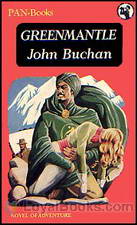 Greenmantle
Greenmantle
Greenmantle is the second of five Richard Hannay novels by John Buchan, first published in 1916 by Hodder & Stoughton, London. It is one of two Hannay novels set during the First World War, the other being Mr Standfast (1919); Hannay’s first and best-known adventure, The Thirty-Nine Steps (1915), is set in the period immediately before the war started. – Hannay is called in to investigate rumours of an uprising in the Muslim world, and undertakes a perilous journey through enemy territory to meet up with his friend Sandy in Constantinople. Once there, he and his friends must thwart the Germans’ plans to use religion to help them win the war, climaxing at the battle of Erzurum. | |
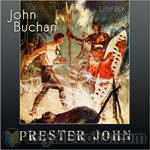 Prester John
Prester John
This classic adventure novel by the author of Greenmantle and The Thirty-Nine Steps relates the first-person exploits of young David Crawfurd before the age of twenty. | |
 Huntingtower
Huntingtower
Dickson McCunn, a respectable, newly retired grocer, plans a walking holiday in the hills of south-west Scotland. He meets a young English poet and finds himself in the thick of a plot involving the kidnapping of a Russian princess, who is held prisoner in the rambling mansion, Huntingtower. This modern fairy-tale is also a gripping adventure story. | |
By: John Bunyan (1628-1688) | |
|---|---|
 Grace Abounding to the Chief of Sinners
Grace Abounding to the Chief of Sinners
Grace Abounding is the spiritual autobiography of John Bunyan, who also penned Pilgrim’s Progress, perhaps one of the most significant pieces of Christian literature, second only to the Bible. Grace Abounding follows Bunyan’s struggle to find true repentance and forgiveness, his battle with Satan’s temptations of unbelief, his comfort found in the Bible and his overarching victory gotten by the grace of God through Jesus Christ his Son. Readers familiar with Pilgrim’s Progress will recognize... | |
By: John Butler Yeats (1839-1922) | |
|---|---|
 Essays Irish and American
Essays Irish and American
From the noted artist and father of the celebrated Irish poet William Butler Yeats comes this short collection of essays on the literary life of their age. Included are two short biographical remembrances of the author. - Summary by Larry Wilson | |
By: John Donne (1572-1631) | |
|---|---|
 Devotions upon Emergent Occasions
Devotions upon Emergent Occasions
Devotions upon Emergent Occasions is a 1624 prose work by the English writer John Donne. It is a series of reflections that were written as Donne recovered from a serious illness, believed to be either typhus or relapsing fever. (Donne does not clearly identify the disease in his text.) The work consists of twenty-three parts describing each stage of the sickness. Each part is further divided into a Meditation, an Expostulation, and a Prayer. The seventeenth meditation is perhaps the best-known part of the work... | |
By: John Galsworthy (1867-1933) | |
|---|---|
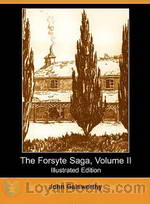 In Chancery (Vol. 2 of The Forsyte Saga)
In Chancery (Vol. 2 of The Forsyte Saga)
‘The Forsyte Saga’ is the story of a wealthy London family stretching from the eighteen-eighties until the nineteen-twenties. In Chancery is the second book in the saga. Five years have passed since Irene left Soames and the death of Bosinney. Old Jolyon meets Irene and is enchanted by her. At his death he leaves her a legacy sufficient for her to live an independent life in Paris. Soames, who is desperate for a son, attempts to effect a rapprochement but is rejected by her. Meanwhile Young Jolyon, now a widower who is Irene’s trustee, falls in love with her... | |
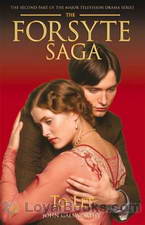 To Let (Vol. 3 of The Forsyte Saga)
To Let (Vol. 3 of The Forsyte Saga)
‘The Forsyte Saga’ is the story of a wealthy London family stretching from the eighteen-eighties until the nineteen-twenties. To Let is the third and final book in the saga (although Galsworthy later published two further trilogies which extend the story). We are now in 1920, about twenty years since Irene married Young Jolyon and gave birth to John and since Soames married Annette, who gave him a daughter, Fleur. The two sides of the family have not met since those times and John and Fleur do not even know of each other’s existence... | |
 Five Tales
Five Tales
This 1918 book consists of five short stories or novelettes by Galsworthy. They are The First and Last (1914), A Stoic, The Apple Tree (1916), The Juryman, Indian Summer of a Forsyte (1918) This last became part of the trilogy The Forsyte Saga. (Introduction by David Wales) | |
 Beyond
Beyond
Gyp, the daughter of ex-Major Charles Claire Winton, at the age of 23 marries Fiorsen, a Swedish violin virtuoso. Her mother, the wife of another man, has been Winton's mistress; she had died when Gyp was born. A highly sensitive child, Gyp has grown up in isolated surroundings with a kind, but very British, father. As she gets older her father tries to introduce her into society. An attack of gout takes him to Wiesbaden for a cure and, as he never goes anywhere without her, she accompanies him... | |
 Skin Game
Skin Game
A small play in three acts. A kind of comic tragedy. The plot tells the story of the interaction between two very different families in rural England just after the end of the First World War. Squire Hillcrist lives in the manor house where his family has lived for generations. He has a daughter, Jill, who is in her late teens; and a wife, Amy, as well as servants and retainers. He is "old money", although his finances are at a bit of low ebb. The other family is the "nouveau riche" Hornblowers,... | |
By: John Gray (1866-1934) | |
|---|---|
 Dial: The First Number of the Series
Dial: The First Number of the Series
The Dial was an art magazine, which ran to five issues between 1889 and 1897. It was edited and published by Charles Ricketts and Charles Shannon from The Vale, their shared home in Chelsea, London. Contributors to this first number include the editors, R. Savage, and the poet John Gray . - Summary by Rob Marland | |